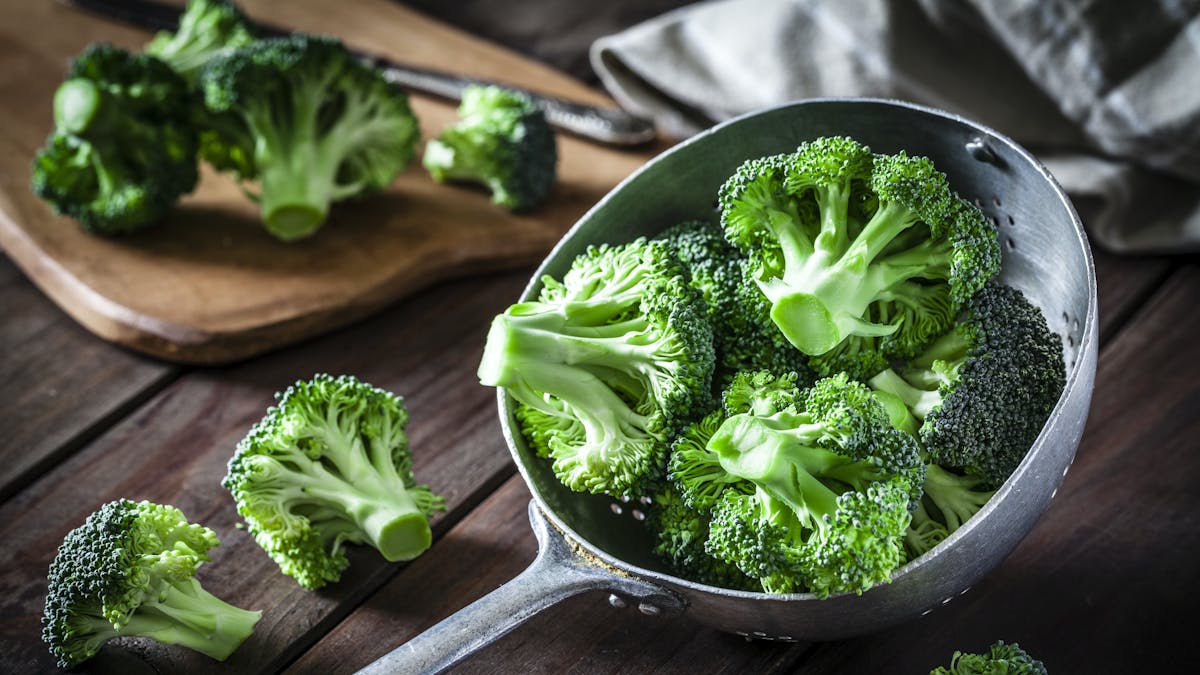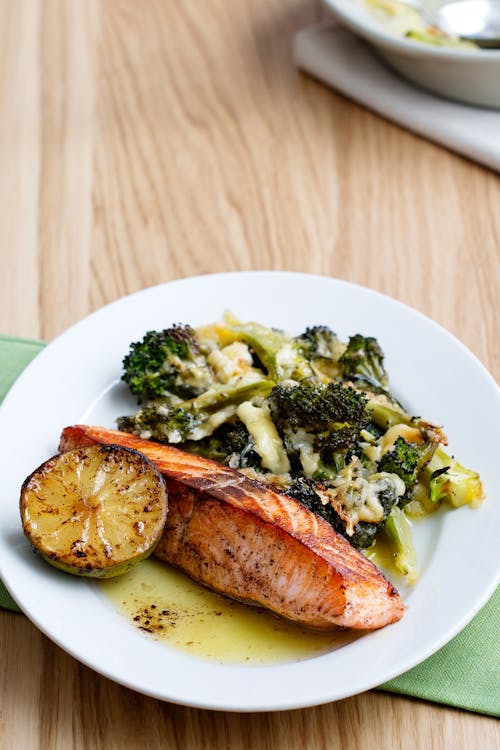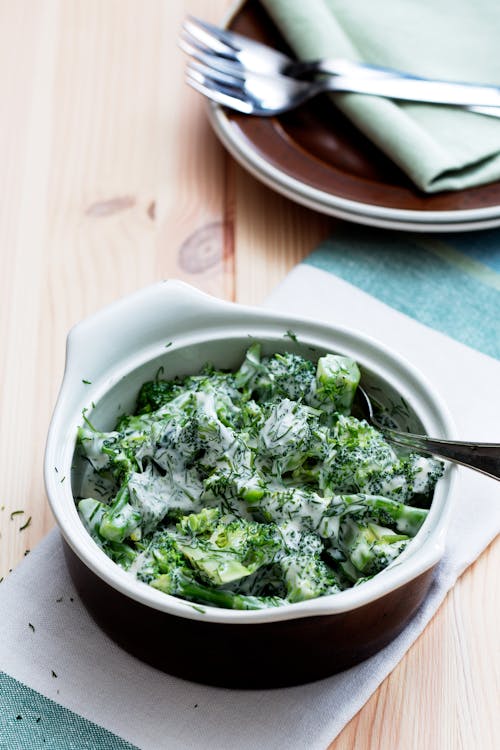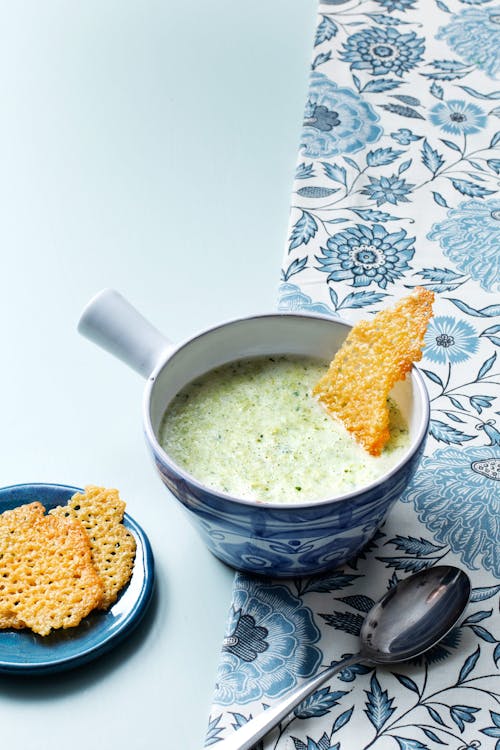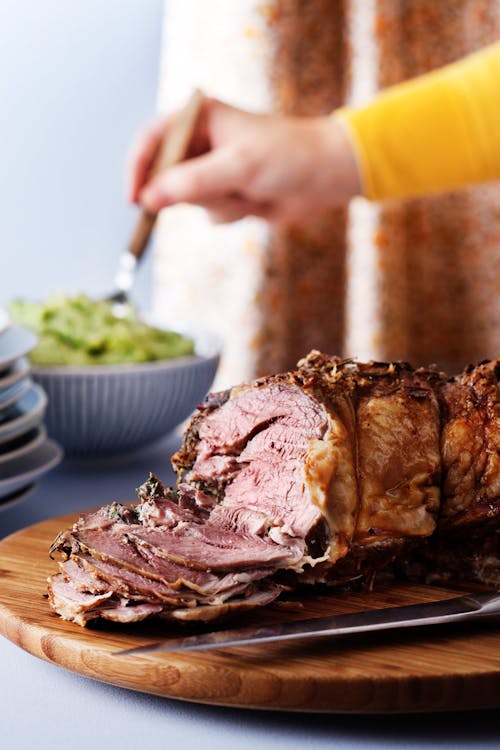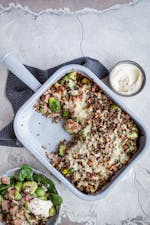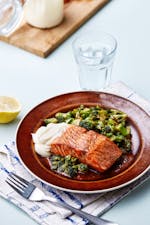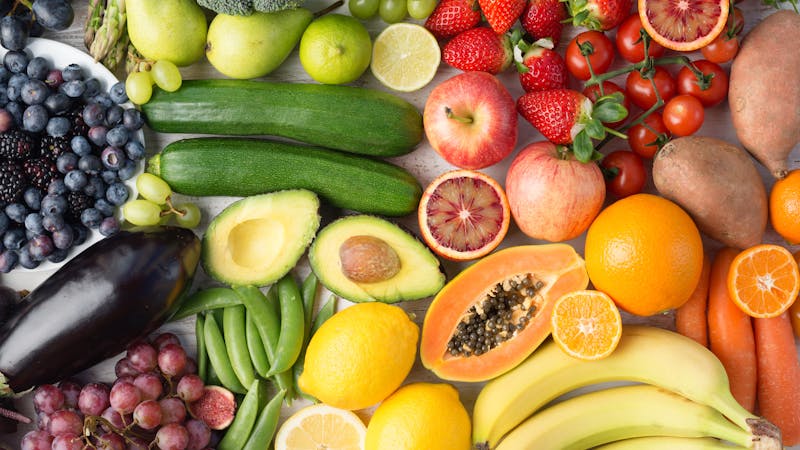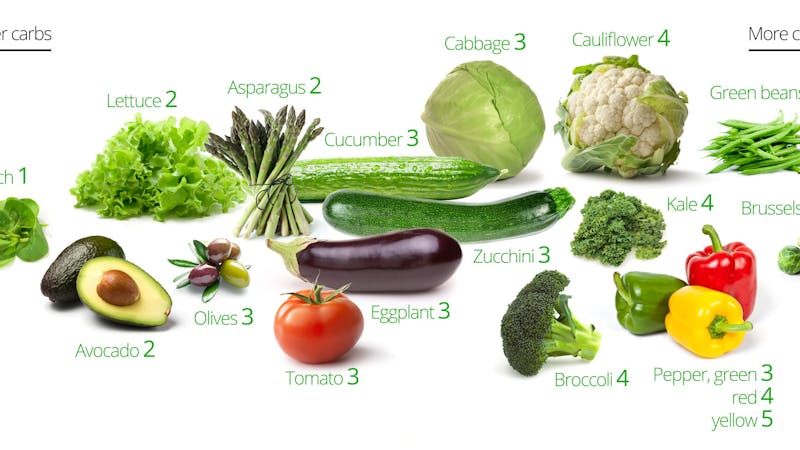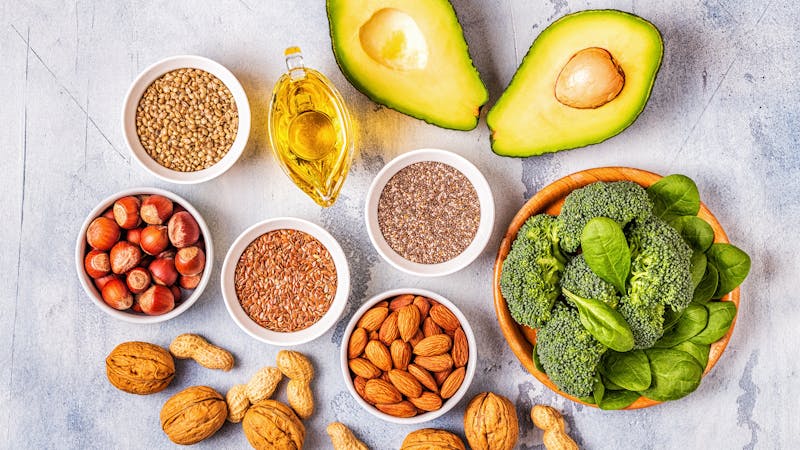Broccoli 101: nutrition facts and tasty tips
Are you a broccoli lover, or not really a fan? Although it can be an acquired taste, broccoli is filling and provides several nutrients for very few calories. It’s also been credited with impressive health benefits. But is there strong evidence to support these claims?
In this guide, you’ll learn all about broccoli, plus tips for including it in your diet.
What is broccoli?
Broccoli (Brassica oleracea italica) is a green vegetable that originated in Italy around the sixth century B.C. Its name comes from the Italian word broccolo, meaning “the flowering crest of a cabbage.”
Like cabbage, broccoli is a member of the cruciferous family of vegetables that also includes Brussels sprouts, cauliflower, and kale. When chopped or cooked, these vegetables release compounds that have a familiar and fairly strong sulfur aroma.
The two most common broccoli varieties are:
- Calabrese broccoli: Also known as Italian green broccoli, Calabrese is the most familiar type in the US. It has thick green stalks and large heads with small buds called florets
- Sprouting broccoli: Similar in appearance to Calabrese broccoli, sprouting broccoli has thinner stalks and smaller heads with florets that are either green or dark purple.
Closely related vegetables include broccolini, also known as baby broccoli, which is a hybrid of broccoli and Chinese broccoli; and broccoflower, a cross between broccoli and cauliflower.
Broccoli nutrition facts
Broccoli is a good source of several vitamins and minerals and is especially rich in vitamin C.
100 grams (3.5 ounces), or approximately one cup of chopped raw broccoli, provides:1
- Vitamin C: 89 mg (149% of the recommended daily intake, or RDI)
- Vitamin K: 102 mcg (127% of the RDI)
- Folate (Vitamin B9): 63 mg (16% of the RDI)
- Vitamin A (from beta-carotene): 623 IU (12% of the RDI)2
- Vitamin B6: 0.2 mg (9% of the RDI)
- Potassium: 316 mg (9% of the RDI)
- Calcium: 47 mg (5% of the RDI)
- Iron: 0.7 mg (4% of the RDI)
Steaming and microwaving broccoli preserve nearly all of its vitamin C, whereas stir-frying leads to a modest loss and boiling reduces vitamin C content by up to 50%.3Broccoli can also lose significant amounts of folate and other B vitamins during boiling.4
Yet, even after boiling, broccoli remains pretty high in vitamin C compared to many other foods. Plus, cooking cruciferous vegetables can make them easier for your body to digest.
So, go ahead and steam, microwave, fry, or boil your broccoli. You’ll still get a hefty dose of nutrients.
Broccoli provides small amounts of all the macronutrients, or “macros.” One cup of raw broccoli has about 3 grams of protein, 0.4 grams of fat, and 7 grams of total carbohydrates, including 3 grams from fiber.5
Broccoli also contains several phytochemicals (“plant chemicals”) that are responsible for its color, smell, and flavor.
How many calories are in broccoli?
A one-cup serving (100 grams) of chopped raw broccoli has just 34 calories.6
One cup of cooked broccoli is slightly higher in calories (and nutrients) than one cup of raw broccoli. This is because, like many vegetables, it loses water and becomes more compact when heated.
A one-cup serving (150 grams) of chopped, cooked broccoli has 55 calories, which is still very few.7
However, at Diet Doctor, we don’t recommend counting calories. If you’re trying to lose weight, including broccoli in your diet — along with nourishing foods that are higher in protein and fat — can be a winning strategy.
Is broccoli a good source of fiber?
Broccoli provides fiber, the non-digestible portion of carbs that can improve constipation and irritable bowel syndrome (IBS) symptoms in some people.8 Fiber has also been linked to other health benefits, such as lower blood sugar and cholesterol levels.9Additionally, it may reduce appetite and help you feel full.10
One cup of chopped, cooked broccoli has 5 grams of fiber. Like other plants, it contains a combination of soluble and insoluble fiber.11 To learn about other foods that can boost your fiber intake, see our list of 15 high-fiber foods.
Broccoli is low in carbs
Results from systematic reviews of high-quality clinical trials are clear: low-carb diets can help people lose weight and improve type 2 diabetes control.12
Like other vegetables that grow above the ground, broccoli contains very few net carbs.13 One cup of broccoli provides about 4 grams of net carbs, making it an excellent option for those who eat low-carb or keto diets.
Does broccoli have proven health benefits?
Cruciferous vegetables like broccoli have a reputation for protecting against cancer and other diseases, due in large part to the phytochemicals they contain. This includes sulforaphane, whose precursor glucoraphanin is especially abundant in young broccoli sprouts.14
However, most experimental studies linking broccoli to better health have been conducted in animals or test tubes, which is considered very weak evidence.15
Other data on broccoli and health comes from observational or epidemiological research. According to some researchers, many of these studies suggest that people who eat the most cruciferous vegetables have lower risk of disease and live longer lives.16
But observational studies can’t provide reliable information about the health effects of specific foods. One issue is that researchers typically rely on self-reported intake via food frequency questionnaires, which have been criticized as highly inaccurate.17
Moreover, people who eat a lot of cruciferous vegetables are also less likely to smoke and more likely to eat a nutritious diet, exercise regularly, drink alcohol in moderation, and practice other health-conscious behaviors, compared to those who eat fewer cruciferous vegetables.
Simply put, observational studies can’t prove that specific foods decrease disease risk or lead to health improvements. They can only show an association between a behavior (e.g., eating broccoli) and an outcome (e.g., better health).
You can read more about this in our guide to observational vs. experimental studies.
At this time, a few clinical trials have tested the effects of broccoli, broccoli sprouts, or broccoli sprout extract on various health markers.18 In some but not all studies, consuming broccoli or broccoli sprout extract was found to lower markers of inflammation in the blood.19 Results from other trials suggest that in some cases, broccoli sprout extract may lower blood sugar, increase insulin sensitivity, and improve some markers of heart disease risk.20
Although results from some of these trials are encouraging, others have been less impressive. What’s more, many of these studies used broccoli sprout extract rather than fresh broccoli, and most were small or of short duration.
So while it’s certainly possible — perhaps even probable — that eating broccoli and other cruciferous vegetables can improve health and reduce disease risk, we need much more high-quality experimental human research to say this with certainty.
Most importantly, your health is much more likely to be influenced by your overall diet and lifestyle rather than one specific food.
Broccoli recipes and ideas
Admittedly, plain broccoli doesn’t taste wonderful to everyone. But when paired with natural fat, it takes on a whole new — and often delicious! — flavor dimension.
Here are a few ideas for making broccoli taste great:
- Steamed: Top freshly steamed broccoli with melted butter and salt.
- Roasted: Place sliced broccoli on a baking sheet lined with parchment paper and drizzle with olive oil and garlic. Bake at 400 degrees F (200 degrees C) for 15 to 20 minutes.
- Fried: We pretty much guarantee you’ll love butter-fried broccoli.
- Add-on: Use leftover broccoli in an omelet or a salad with a creamy dressing.
In a rush? Use frozen broccoli. It’s been washed, cut, and is ready for the microwave, steamer, or skillet.
Also, be sure to check out these tasty Diet Doctor recipes featuring broccoli:
Broccoli recipes
Broccoli meal plan
Are you a big fan of cruciferous vegetables such as broccoli? As a Diet Doctor member, you can access the meal plan with quick and tasty brassica meals below.
![Keto Brussels sprouts and hamburger gratin]() Mon
Mon![Italian keto chicken parmesan with cabbage pasta]() Tue
Tue![Keto fried salmon with broccoli and lemon mayo]() Wed
Wed![Keto Reuben skillet]() Thu
Thu![Creamy keto fish casserole]() Fri
Fri![Keto beef ramen]() Sat
Sat![Keto coconut salmon with Napa cabbage]() Sun
Sun
Take home message
Broccoli is rich in nutrients, yet low in carbs and calories. Be sure to pair it with fat and salt or other seasonings to enhance its earthy flavor.
Although broccoli’s potential health benefits remain to be proven, this versatile cruciferous veggie can be a great addition to your life, no matter what kind of diet you eat.
/ Franziska Spritzler, RD, CDE
Learn how to do a keto diet
Broccoli 101: nutrition facts and tasty tips - the evidence
This guide is written by Franziska Spritzler, RD and was last updated on June 19, 2025. It was medically reviewed by Dr. Bret Scher, MD on November 16, 2020.
The guide contains scientific references. You can find these in the notes throughout the text, and click the links to read the peer-reviewed scientific papers. When appropriate we include a grading of the strength of the evidence, with a link to our policy on this. Our evidence-based guides are updated at least once per year to reflect and reference the latest science on the topic.
All our evidence-based health guides are written or reviewed by medical doctors who are experts on the topic. To stay unbiased we show no ads, sell no physical products, and take no money from the industry. We're fully funded by the people, via an optional membership. Most information at Diet Doctor is free forever.
Read more about our policies and work with evidence-based guides, nutritional controversies, our editorial team, and our medical review board.
Should you find any inaccuracy in this guide, please email andreas@dietdoctor.com.
Vitamin A, or retinol, is only found in animal foods. Your body converts beta-carotene from plants into vitamin A. ↩
According to studies, boiling broccoli decreases its vitamin C content by 33% to 50%:
Journal of Zhejiang University. Science. B. 2014: Effects of different cooking methods on health-promoting compounds of broccoli [nutrient analysis; ungraded]
Food Science and Biotechnology 2017: Effect of different cooking methods on the content of vitamins and true retention in selected vegetables [nutrient analysis; ungraded] ↩
One study found that boiling broccoli decreased its folate content by 56%, while steaming for up to 15 minutes resulted in no observable folate loss. Although losses and retention of other B vitamins weren’t reported, they are presumably similar due to being equally water-soluble:
The British Journal of Nutrition 2002: The effect of different cooking methods on folate retention in various foods that are amongst the major contributors to folate intake in the UK diet [nutrient analysis; ungraded] ↩
Fiber is subtracted from total carbs to get net carbs. Therefore, there are 4 net carbs in one cup of raw broccoli. ↩
The American Journal of Gastroenterology 2014: The effect of fiber supplementation on irritable bowel syndrome: a systematic review and meta-analysis [systematic review of randomized trials; strong evidence] ↩
Nutrition Reviews 2013: Fiber intake and glycemic control in patients with type 2 diabetes mellitus: a systematic review with meta-analysis of randomized controlled trials [systematic review of randomized trials; strong evidence]
The Cochrane Database of Systematic Reviews 2016: Dietary fibre for the primary prevention of cardiovascular disease [systematic review of randomized trials; strong evidence] ↩
Obesity Reviews 2011: Effects of dietary fibre on subjective appetite, energy intake and body weight: a systematic review of randomized controlled trials [systematic review of randomized trials; strong evidence] ↩
Soluble fiber is fermented by bacteria that live in your gut, while insoluble fiber helps bulk up your stools and makes them easier to pass. ↩
Several systematic reviews of randomized controlled studies (RCTs) have concluded that low-carb diets are often superior to low-fat diets for weight loss and reducing blood glucose levels in people with type 2 diabetes:
Obesity Reviews 2016: Impact of low-carbohydrate diet on body composition: meta-analysis of randomized controlled studies [strong evidence]
Nutrients 2020: Impact of a ketogenic diet on metabolic parameters in patients with obesity or overweight and with or without type 2 diabetes: A meta-analysis of randomized controlled trials [systematic review of randomized trials; strong evidence]
BMJ Open Diabetes Research and Care 2017: Systematic review and meta-analysis of dietary carbohydrate restriction in patients with type 2 diabetes [systematic review of randomized trials; strong evidence] ↩
Net carbs = total carbs minus fiber ↩
During digestion, your body converts glucoraphanin into sulforaphane, which some researchers believe may help protect against cancer and other diseases:
Journal of Medicinal Food 2019: Isothiocyanate from broccoli, sulforaphane, and its properties [overview article; ungraded]
Broccoli is also rich in indole-3-carbinol, another compound with potential anti-cancer effects:
Molecular Nutrition & Food Research 2016: Research on cruciferous vegetables, indole-3-carbinol, and cancer prevention: A tribute to Lee W. Wattenberg [overview article; ungraded] ↩
Plant Foods for Human Nutrition 2019: Dietary broccoli sprouts protect against myocardial oxidative damage and cell death during ischemia-reperfusion [mouse study; very weak evidence]
Preventive Nutrition and Food Science 2017: Broccoli ( Brassica oleracea) reduces oxidative damage to pancreatic tissue and combats hyperglycaemia in diabetic rats
[rat study; very weak evidence]Journal of the American Medical Association 2019: Compound in broccoli restores tumor suppressor activity
[mechanistic study; very weak evidence]International Journal of Food Sciences and Nutrition 2018: Broccoli and human health: immunomodulatory effect of sulforaphane in a model of colon cancer [mechanistic study; very weak evidence] ↩
Nutrition and Cancer 2014: Cruciferous vegetables and risk of colorectal neoplasms: a systematic review and meta-analysis [observational study; very weak evidence]
The Breast 2013: Cruciferous vegetables intake is inversely associated with risk of breast cancer: a meta-analysis [observational study; very weak evidence]
Primary Care Diabetes 2016: Consumption of citrus and cruciferous vegetables with incident type 2 diabetes mellitus based on a meta-analysis of prospective study [observational study; very weak evidence]
Clinical Nutrition 2019: Cruciferous vegetable intake and mortality in middle-aged adults: A prospective cohort study [observational study; very weak evidence] ↩
Cancer Epidemiology, Biomarkers & Prevention 2005: Is it time to abandon the food frequency questionnaire? [Commentary — no evidence] ↩
Broccoli sprout extract is highly concentrated and provides more sulforaphane than people can likely obtain from eating even large amounts of broccoli:
Molecules 2019: Broccoli or sulforaphane: Is it the source or dose that matters? [overview article; ungraded] ↩
Small trials of overweight people and smokers found that increased intake of broccoli or broccoli sprouts reduced levels of c-reactive protein (CRP):
Clinical Nutrition 2019: Effects of long-term consumption of broccoli sprouts on inflammatory markers in overweight subjects [non-controlled study; weak evidence]
International Journal of Food Sciences and Nutrition 2014: Effect of 10-day broccoli consumption on inflammatory status of young healthy smokers [non-controlled study; weak evidence]
By contrast, an RCT in people with asthma found that consuming broccoli sprouts did not reduce pulmonary inflammation or markers of inflammation:
The Journal of Allergy and Clinical Immunology 2016: A randomized controlled trial of the effect of broccoli sprouts on antioxidant gene expression and airway inflammation in asthmatics [randomized trial; moderate evidence] ↩
In a 12-week RCT in people with type 2 diabetes, obese participants with poor glycemic control who consumed broccoli sprouts extract had significant reductions in fasting blood sugar and HbA1c compared to those who consumed a placebo. However, in non-obese participants with poor glycemic control, broccoli sprouts extract had no effect on HbA1c and only lowered fasting blood glucose slightly:
Science Translational Medicine 2017: Sulforaphane reduces hepatic glucose production and improves glucose control in patients with type 2 diabetes [randomized trial; moderate evidence]
International Journal of Food Sciences and Nutrition 2012: Effect of broccoli sprouts on insulin resistance in type 2 diabetic patients: a randomized double-blind clinical trial [randomized trial; moderate evidence]
Diabetes Research and Clinical Practice 2012: Broccoli sprouts powder could improve serum triglyceride and oxidized LDL/LDL-cholesterol ratio in type 2 diabetic patients: a randomized double-blind placebo-controlled clinical trial [randomized trial; moderate evidence] ↩
